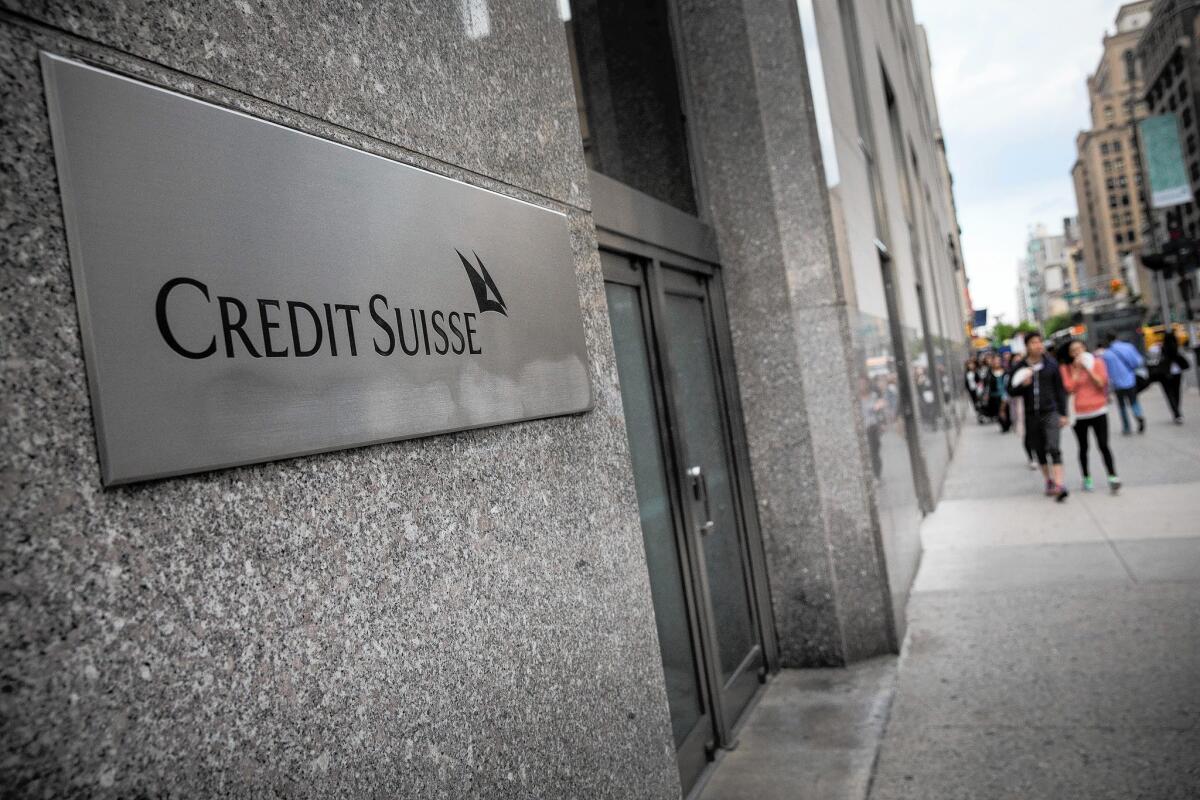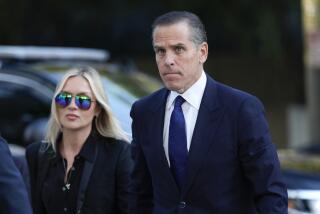Credit Suisse pleads guilty to helping Americans avoid income taxes

- Share via
Reporting from washington — Swiss banking giant Credit Suisse pleaded guilty to a criminal charge that it helped wealthy Americans dodge income taxes for decades, a plea federal officials said bolstered their efforts to show that no financial firm was too big to prosecute.
The bank agreed to pay $2.6 billion — the most ever in a criminal case — as part of a deal ending a lengthy Justice Department investigation. The inquiry also has led to the indictment of eight company employees, two of whom have pleaded guilty so far.
“This case shows that no financial institution, no matter its size or global reach, is above the law,” Atty. Gen. Eric H. Holder said Monday in announcing the action.
The Obama administration has been criticized for not pursuing criminal charges more aggressively against large financial institutions and their executives stemming from the 2008 financial crisis.
Holder has been the focus of much of that criticism, particularly after testifying at a Senate hearing last year that some financial institutions were “so large that it becomes difficult to prosecute them” because criminal charges could harm the U.S. and world economies.
But in January, Holder declared that no bank was “too big to indict” and promised action against “significant financial institutions.”
Bryan Skarlatos, a partner at law firm Kostelanetz & Fink in New York, said the Credit Suisse case should put Wall Street on notice.
“This is a big milestone because it shows the Department of Justice intends to follow through” on its promise to crack down on financial wrongdoing, Skarlatos said.
The case against Credit Suisse is not related to the financial crisis. Instead, it strikes at Switzerland’s long history as a banking haven for those looking to avoid taxes.
Holder said Credit Suisse was the largest bank to plead guilty to U.S. criminal charges in 20 years. In late 2012, Swiss bank UBS pleaded guilty to wire fraud in an interest-rate manipulation case.
“Hundreds of Credit Suisse employees, including at the manager level, conspired to help tax cheats dodge U.S. taxes,” Holder said.
Through the use of secret offshore accounts, the bank engaged in an “extensive and wide-ranging conspiracy” that in the case of one subsidiary began more than 100 years ago.
In an agreement filed in federal court Monday, Credit Suisse pleaded guilty to one count of conspiracy to aid taxpayers in filing false income tax returns and other documents with the Internal Revenue Service.
The bank agreed to pay fines of $1.8 billion to the Justice Department and $715 million to the New York State Department of Financial Services. Credit Suisse also agreed to pay a $100-million penalty to the Federal Reserve, which oversees its U.S. banking operations.
“We deeply regret the past misconduct that led to this settlement,” said Credit Suisse Chief Executive Brady Dougan, an American who is expected to keep his job despite the bank’s guilty plea. “Having this matter fully resolved is an important step forward for us.”
In a Senate hearing in February, Dougan and other top Credit Suisse executives admitted that the bank helped Americans shield as much as $12 billion from taxes in 22,000 accounts at the bank from 2001 to 2008 and acknowledged that the practice was a “mistake” and “unacceptable.”
But executives argued that Swiss bank-secrecy laws prohibited the institution from revealing the names of tax-dodging U.S. citizens to federal officials.
Monday’s plea agreement did not require Credit Suisse to turn over any additional names beyond about 238 it had provided under a tax treaty between the U.S. and Switzerland.
Sen. Carl Levin (D-Mich.), who chaired that hearing as part of a six-year effort against tax evasion, criticized the Justice Department for not obtaining more names of account holders.
“This guilty plea strikes an important blow against tax evasion through bank secrecy,” Levin said. “But it is a mystery to me why the U.S. government didn’t require as part of the agreement that the bank cough up some of the names of the U.S. clients with secret Swiss bank accounts.”
For years, authorities have been reluctant to bring criminal charges against mammoth financial institutions. Officials have worried that even the existence of criminal allegations could topple a major bank and lead to a cascading effect throughout Wall Street and the economy.
That fear is behind the wide-ranging debate known as “too big to fail.” It also has sparked concern that Wall Street has a sort of impunity in which firms can engage in questionable financial behavior because they believe the government would, in the end, bail them out to prevent wider economic havoc.
Critics said the unwillingness to bring the hammer down on major banks and their top executives effectively has fanned wrongdoing on Wall Street.
Times staff writer Timothy M. Phelps contributed to this report.
More to Read
Inside the business of entertainment
The Wide Shot brings you news, analysis and insights on everything from streaming wars to production — and what it all means for the future.
You may occasionally receive promotional content from the Los Angeles Times.











